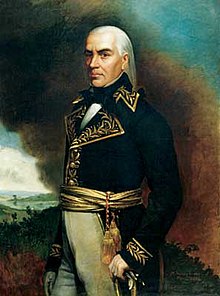
Back Francisco de Miranda AN فرنسيسكو ميراندا Arabic فرنسيسكو ميراندا ARZ Francisco de Miranda AY Франсіска Міранда BE Франсиско де Миранда Bulgarian ফ্রান্সিস্কো দে মিরান্ডা Bengali/Bangla Francisco de Miranda BS Francisco de Miranda Catalan Francisco de Miranda Czech
Francisco de Miranda | |
|---|---|
 Portrait by Martín Tovar y Tovar | |
| Supreme Chief of Venezuela | |
| In office 25 April 1812 – 26 June 1812 | |
| Preceded by | Francisco Espejo |
| Succeeded by | Simón Bolívar (As President of the Second Republic of Venezuela) |
| Personal details | |
| Born | Sebastián Francisco de Miranda y Rodríguez de Espinoza 28 March 1750 Caracas, Venezuela Province, Viceroyalty of New Granada, Spanish Empire |
| Died | 14 July 1816 (aged 66) Cádiz, Spain |
| Profession | Military |
| Nickname(s) | The Precursor The First Universal Venezuelan The Great Universal American |
| Military service | |
| Allegiance | |
| Years of service | 1773–1783 1791–1793 1811–1812 |
| Rank | Generalissimo |
| Battles/wars | |
Sebastián Francisco de Miranda y Rodríguez de Espinoza (28 March 1750 – 14 July 1816), commonly known as Francisco de Miranda (Latin American Spanish: [fɾanˈsisko ðe miˈɾanda]), was a Venezuelan military leader and revolutionary who fought in the American Revolutionary War, the French Revolution and the Spanish American wars of independence. He is regarded as a precursor of South America's liberation from the Spanish Empire, and remains known as the "First Universal Venezuelan" and the "Great Universal American".
Born in Caracas in the Viceroyalty of New Granada into a wealthy family, Miranda left to pursue an education in Madrid in 1771 and subsequently enlisted in the Spanish army. In 1780, following Spain's entry into the American Revolutionary War, he was sent to Cuba and fought the British at Pensacola. Accused of espionage and smuggling, he fled to the United States in 1783. Miranda returned to Europe in 1785 and travelled through the continent, gradually formulating his plans for Spanish American independence. From 1791 on, he took an active part in the French Revolution, serving as a general during the Battle of Valmy and the Flanders campaign. An associate of the Girondins, he became disillusioned by the Revolution and was forced to leave for Britain.
In 1806, Miranda launched an unsuccessful expedition to liberate Venezuela with volunteers from the United States. He returned to Caracas following the outbreak of the Venezuelan War of Independence in 1810 and was granted dictatorial powers after the establishment of the First Republic. In 1812, the republic collapsed and Miranda was forced to finalize an armistice with Spanish royalists. Other revolutionary leaders including Simón Bolívar considered his capitulation treasonous, and allowed his arrest by the Spanish authorities. He was taken to a prison in Cádiz, where he died four years later.